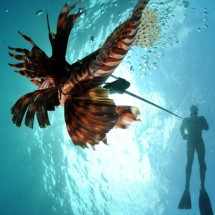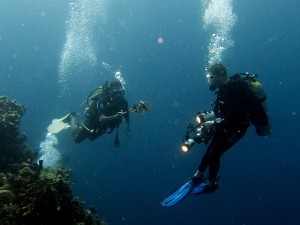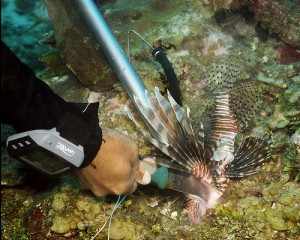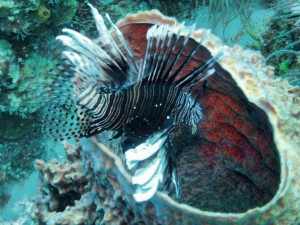 Ever since they were first released into the Atlantic in the 1980s, the amount of lionfish has experienced a population increase of epic proportions. These days they pose an imminent threat to the reefs they invade, partly because of their ferocious appetite of native reef fish as well as not having any natural predators. The only way to reinstate the needed balance, is by actively hunting (and eating) them.
Ever since they were first released into the Atlantic in the 1980s, the amount of lionfish has experienced a population increase of epic proportions. These days they pose an imminent threat to the reefs they invade, partly because of their ferocious appetite of native reef fish as well as not having any natural predators. The only way to reinstate the needed balance, is by actively hunting (and eating) them.
 Instruction
Instruction
There are several groups that offer training for volunteer divers that want to participate. One of the more prominent organizations being lionfishhunters.org, arranged by Vone Research and based in Pompano Beach, Florida. If you volunteer, they will educate you on what tools are required, and how to properly use them. However, you have to purchase the equipment. With other groups you might have to pay for education, but bear in mind that it’s for a good cause.
Keep A Safe Distance, Approach Carefully
Because the lionfish don’t proactively attack, you have to come into close proximity with the venomous spines, keeping a safe distance is the first step to ensure you don’t experience a painful mistake. Make sure that you have full control of your buoyancy before you close the gap, and don’t get to close before you spear the fish.
 Use The Right Equipment
Use The Right Equipment
There are two approaches to hunting lionfish, one revolves around catching them alive i.e. with a catch bag; which is more dangerous, challenging and time consuming. And the other is about spearing the fish. For this you can either use a spear gun, a pole spear or a hawaiian sling. Then there is puncture-gloves, tongs and other tools to avoid getting stung when handling the fish. Some choose to use trauma shears, to cut off the spikes and avoid getting stung when not paying attention.
You could purchase the equipment from a dive store, or you could build your own hawaiian sling from scratch (See video below)
Maintain Normal Diving Procedures
Don’t get distracted and forget your training. Don’t try to cut corners trying to eliminate the fish as fast as possible…the everyday risks of scuba diving still apply. The consequences of losing sight of your depth, air pressure, etc. can be greater than the typical effects of getting stung by a lionfish.
 Be Careful, Pay Attention
Be Careful, Pay Attention
Most of the accidents where divers get stung happens when they get ahead of themselves, or simply don’t pay attention. For example if you have already caught the fish, you cannot forget the fact that you are still able to get stung by a dead fish. If you handle the post catch carelessly, you could end up with repercussions ranging from swelling, nausea, to severe pain. Or in severe cases, death from an allergic reaction.
The best practice is to spear the lionfish with a hawaiian sling and a paralyzing tip. After you spear the fish, pin it down on the seafloor and use paramedic’s shears to remove the venomous spines. Once these have been removed, the thread from the lionfish has been mitigated and you are safe from any accidental mishandling.
Bottom line
With careful planning, and proper handling you will experience a safe lionfish hunt and enjoy a very tasty treat while helping the ecosystem.
Article originally published on http://www.scuba-blog.com





